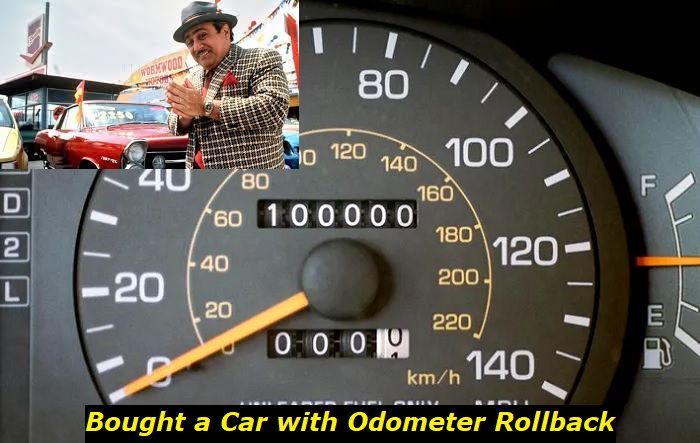Various transmissions may have different common problems. And I've already reviewed several types of transmissions with their issues and ways to fix them. In this article, I want to concentrate on common issues that can happen with almost any modern transmission.
Of course, my focus will be on automatic transmissions because they make up about 95% of the US market. Or even more, if you only take new cars into account.
.jpg)
So, here, you will learn about the common problems for modern transmissions and several ways how to fix them. I will also give links to other articles at Cararac.com for your further investigation.
Transmission problems after engine swap
Very often, our readers ask me why their transmissions don't want to work after an engine swap. There are two possible reasons: whether the transmission needs a professional reset or something was installed incorrectly.
Sometimes, just one disconnected sensor may be the reason for your problem. But, in most cases, you will need to check if everything is assembled properly.
Gearbox issues after engine swap highlights:
- Level of importance:High
- Reasons:Incorrect installation, need for reset
- Needed expertise:High
- Needed tools:Professional tools set
- Time taken:3-7 hours
- Can you drive? Usually, no.
- Possible issues: No shifting, limp mode, strange sounds, error messages and warnings on dash.
Wiring problems in transmissions
Electronics in modern transmissions shouldn't be considered really high-quality and reliable. The majority of modern gearboxes are prone to electronics problems.
But sometimes, those issues start with wiring problems. I've written an article about wiring harness problems in transmissions. Unfortunately, there are almost no DIY solutions because when it comes to wiring, you certainly need professional help.
If you suspect wiring issues, you may try to reset the gearbox - there are certain procedures that will help you do this even with zero tools and knowledge. But if it doesn't help, the problem should be considered serious.
Also, wiring and electronics are responsible for almost all possible symptoms in modern transmissions, so keep this in mind.
Transmission wiring problems highlights:
- Level of importance:High
- Reasons:Wiring disconnected, corrosion damage
- Needed expertise:High
- Needed tools:Professional tools set
- Time taken:2-10 hours
- Can you drive? Only in limp mode
- Possible issues: Dead transmission, no shifting, no reactions, glitchy reactions.
1st to 2nd gear jerk in automatic transmission
One of the most common problems in conventional automatic transmission is jerking when shifting from 1st to 2nd gear. Also, DCT units (dual-clutch transmissions) are prone to this problem.
Usually, this may happen when the fluid level is low or the quality of the fluid is not perfect. But, sometimes, it may also mean other issues with control units or with transmission hardware.
Very often, this may mean that more serious problems are coming soon. And jerking is just the way of your gearbox to tell you about this before the disaster happened. So, don't ignore this.
The issue may be even more serious if you hear a clunking noise when the gearbox shifts between these two gears. This is a clear sign your car needs urgent help.
Jerking when shifting from 1st to 2nd gear highlights:
- Level of importance:Medium
- Reasons:Issues with fluid, electronic control problems, hardware problems
- Needed expertise:High
- Needed tools:Professional tools set
- Time taken:1-10 hours
- Can you drive? Carefully
- Possible issues: Fatal damage, issues with torque converter, inconvenient driving.
Transmission shuddering problems
You may have noticed that your automatic transmission may shudder when at low speed or when the car isn't moving. It may also shudder at high speed but you won't notice this.
While in some cases, this shuddering problem may be just the way your gearbox works, in other cases, you may need professional help. Of course, this all depends on the type of transmission and its technologies.
It's more common for automatic transmissions to vibrate in reverse and it doesn't always mean that there is a problem. Also, the reason for vibrations may be the low temperature of the fluid. If the gearbox keeps shuddering when warmed up, this can be a sign of a problem.
Another bad symptom is the rattling noise that may accompany the work of your transmission. This is yet another clear sign of problems.
As to what exactly problems this symptom may show, there are various options. These gearbox issues may be hard to diagnose without professional help.
Transmission shuddering problem highlights:
- Level of importance:Medium
- Reasons:Low fluid, wrong fluid, cold transmission, issues with torque converter
- Needed expertise:High
- Needed tools:Professional tools set
- Time taken:3-7 hours
- Can you drive? Carefully
- Possible issues: Torque converter wear and tear, issues if shuddering gets worse.
Automatic transmission malfunction message
If your car shows the Automatic transmission malfunction error message and possible other warnings, there is a chance that the gearbox has developed problems with its electronic control unit.
This warning doesn't point you to any actual problem but says that the control unit sees some issues according to the sensors' readings. Sometimes, this can be just a broken sensor. But very often, this message may actually tell you about the upcoming problems with your transmission.
I've experienced several cases when even the TPS (tire-pressure monitoring system) caused a transmission error message to come up on the dash. So, almost any sensor can do this.
Interestingly, these issues can be triggered with no check engine light. Why? Because transmission trouble codes are not usually stored in the ECU, the check engine light is not activated. Instead of the check engine light, there may be another sign like the blinking D light or some other warning on the dash.
Automatic transmission malfunction highlights:
- Level of importance:Medium
- Reasons:Electronic control problems, shifter issues, sensor-related issues
- Needed expertise:High
- Needed tools:Professional tools set
- Time taken:1-8 hours
- Can you drive? Not recommended
- Possible issues: Fatal damage, overheating, torque converter damage, TCU damage.
CV axle stuck in transmission
First of all, if you don't have experience in removing the transmission from a car, don't ever do it on your own. There are issues that can happen and eventually lead to you spending hundreds of dollars for repairs that weren't necessary at first.
If the CV axle is stuck in the transmission, there is a chance that you are not removing it correctly. Use a pry bar and remember that there is a circular clip holding the axle in the gearbox. Turn the axle several times and apply the pry bar to successfully take it off.
CV axle stuck problem highlights:
- Level of importance:High
- Reasons:Damaged axle, wrong procedure
- Needed expertise:Medium
- Needed tools:Pry bar
- Time taken:0.5-1 hour
- Can you drive? No
- Possible issues: Transmission damage, CV axle damage, no way to finish repair.
Loose torque converter bolts problem
There is a slight possibility of loose torque converter bolts. You may experience this after DIY transmission repair without a torque wrench. In this case, you will hear a ticking noise when the gearbox is running.
Driving in this condition is not recommended. You may destroy the converter!
But, in most cases, if you suddenly hear the ticking noise from your transmission, it means that the torque converter is about to die or there is another issue in the gearbox itself. Of course, there are other torque converter noises that need to be considered before making any decision about repairs.
Loose torque converter bolt problem highlights:
- Level of importance:High
- Reasons:Torque converter problem, actually loose bolts
- Needed expertise:High
- Needed tools:Basic tools
- Time taken:1.5-3 hours
- Can you drive? Not recommended
- Possible issues: Torque converter damage, fatal transmission damage.
Gear shifter problems
One of the most common problems with modern automatic transmissions is the problem with gear shifter. Even in manual cars, it may be hard to shift exactly because of the shifter issues.
If the automatic shifter doesn't engage and doesn't change the modes, it means that the shifter itself is broken. You may try turning the vehicle off and on to see if it's just an electronic glitch. But if it doesn't help, you will need some assistance.
There was a very common problem with Ford Ranger trucks with the part called shift linkage. It's sometimes found in other Ford vehicles, too.
Also, it's not uncommon for the shifter to make some noises. For example, the clicking noise means that the electrical contacts aren't engaged and the shifter is not able to do its job correctly right now.
If there are mechanical issues with the shifter assembly, it may have no resistance. In this case, the modes will not switch and you will not be able to drive the car till the shifter is repaired or even replaced. The same problem is with the stuck gear shift which is very common for many GM cars.
Gear shifter problems highlights:
- Level of importance:High
- Reasons:Shifter damage, wiring problems, software glitch
- Needed expertise:Medium
- Needed tools:Basic tools plus diagnostic tools
- Time taken:0.5-4 hours
- Can you drive? Yes, if it shifts
- Possible issues: No way to move your car, shifter is broken, need for tow truck.
Transmission won't shift
One of the common ways for any automatic transmission to malfunction is to refuse to shift. If it won't shift from a certain gear when accelerating or it won't even shift to the first gear when you are trying to start driving, the problem is obvious and it can't be ignored.
One of the obvious symptoms of this is that your car is in Drive but revs like it's in Neutral. It means the transmission can't engage the first gear so you won't move. Alternatively, it can shift to the first gear and you may start driving but then it revs up high and won't shift into any other higher gear.
Also, it's pretty common for automatic transmission to not go into reverse.
While one of the common reasons for this is the torque converter problem, you may also blame fluid. Very often fluid change can lead to the no-shift issue. Also, after the battery was low for some time, there may be issues with the control module.
Fixing this issue on your own is pretty hard, so you will need to have expertise and tools for this.
Transmission no-shift problem highlights:
- Level of importance:High
- Reasons:Control module failure, low fluid,badfluid, mechanical issues
- Needed expertise:High
- Needed tools:Professional tools set
- Time taken:5-10 hours
- Can you drive? Yes, if some gears engage
- Possible issues: Fatal transmission damage, car stationary.
Transmission delays shifting gears
Sometimes, people call this problem a "loose transmission band" symptom. This is not a precise description as bands are only found in CVTs, there are no bands in other types of gearboxes.
One of the first signs of the problem is delaying going into reverse. You engage Reverse and suddenly see that the car hesitates for some time before doing this. Also, this may seem like the vehicle is losing power in a certain gear just because no gear is engaged or the lower gear is in power when it shouldn't be anymore.
If you happen to notice a gear change delay of any type, you should immediately check the level of fluid in the gearbox. Also, you may want to stop your car for a while and let the transmission cool down just in case it's hot. Alternatively, the problem is in the torque converter and it needs repair or replacement.
You may wonder how fluid can go lower in the sealed transmission. Well, you should know about BMW's mechatronic sleeve problem, for example, as one of the proofs that gearboxes may leak fluid.
Transmission shifting delay problem highlights:
- Level of importance:Medium
- Reasons:Low fluid, overheating, torque converter problems
- Needed expertise:High
- Needed tools:Depends on the reason
- Time taken:1-8 hours
- Can you drive? Carefully
- Possible issues: Fatal transmission failure, torque converter damage.
Grinding or whining noises in transmissions
Automatic and manual transmissions should work silently as if they don't exist in your car. If you hear their work, there is a big chance that something is wrong.
Whining noises usually tell you about a problem with one of the bearings. Unfortunately, it's very often hard to solve because bearings are inside the gearbox and hard to reach.
Grinding noises usually show issues with gears or torque converter. In this case, driving further may kill your transmission and lead to costly replacement rather than repair.
No one can tell you for sure how long the noisy transmission will last. It may be years but it may also be minutes.
Noisy transmission highlights:
- Level of importance:Medium
- Reasons:bearing problems, gears grinding, torque converter issues
- Needed expertise:High
- Needed tools:Professional tools set
- Time taken:5-10 hours
- Can you drive? Not recommended
- Possible issues: Serious damage to gearbox, gears failure.
Transmission stops working suddenly
When you own a car with an automatic transmission, it's not that weird for it to stop working suddenly. Usually, this happens right after you start the engine but sometimes it may also happen unexpectedly after several minutes when you start driving.
If you still can drive when you move the shifter to 1 or 2 instead of D, the problem may be with the shifter linkage or cables in older transmissions. But usually, the issue is with the control module which can be shorted, broken, disconnected, or affected by anything else.
In the case of the TCM problem, other weird things may be happening to your transmission. For example, it can go into neutral when the car is stopped. Or it may shift chaotically.
In any case, there are no DIY ways to solve the problem. You need to have it inspected as soon as possible.
Transmission stops working problem highlights:
- Level of importance:Medium
- Reasons:TCM problems, low fluid, shifter issues
- Needed expertise:High
- Needed tools:Professional tools set
- Time taken:3-8 hours
- Can you drive? Yes, if possible
- Possible issues:Torque converter damage, overheating, TCM damage.
About the authors
The CarAraC research team is composed of seasoned auto mechanics and automotive industry professionals, including individuals with advanced degrees and certifications in their field. Our team members boast prestigious credentials, reflecting their extensive knowledge and skills. These qualifications include: IMI: Institute of the Motor Industry, ASE-Certified Master Automobile Technicians; Coventry University, Graduate of MA in Automotive Journalism; Politecnico di Torino, Italy, MS Automotive Engineering; Ss. Cyril and Methodius University in Skopje, Mechanical University in Skopje; TOC Automotive College; DHA Suffa University, Department of Mechanical Engineering






Add comment